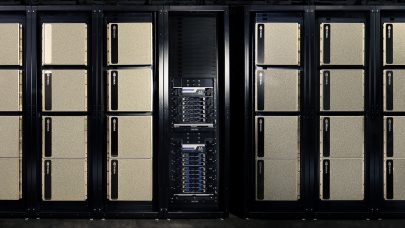
Nvidia Launches AI Factories in DGX Cloud Amid the GPU Squeeze
July 25, 2023
Nvidia is now renting out its homegrown AI supercomputers with its newest GPUs in the cloud for those keen to access its hardware and software packages. Th Read more…

Tesla Bulks Up Its GPU-Powered AI Super – Is Dojo Next?
August 16, 2022
Tesla has revealed that its biggest in-house AI supercomputer – which we wrote about last year – now has a total of 7,360 A100 GPUs, a nearly 28 percent uplift from its previous total of 5,760 GPUs. That’s enough GPU oomph for a top seven spot on the Top500, although the tech company best known for its electric vehicles has not publicly benchmarked the system. If it had, it would... Read more…

Enter Dojo: Tesla Reveals Design for Modular Supercomputer & D1 Chip
August 20, 2021
Two months ago, Tesla revealed a massive GPU cluster that it said was “roughly the number five supercomputer in the world,” and which was just a precursor to Tesla’s real supercomputing moonshot: the long-rumored, little-detailed Dojo system. Read more…

Ahead of ‘Dojo,’ Tesla Reveals Its Massive Precursor Supercomputer
June 22, 2021
In spring 2019, Tesla made cryptic reference to a project called Dojo, a “super-powerful training computer” for video data processing. Then, in summer 2020, Tesla CEO Elon Musk tweeted: “Tesla is developing a [neural network] training computer... Read more…

- Click Here for More Headlines

Whitepaper
Transforming Industrial and Automotive Manufacturing
In this era, expansion in digital infrastructure capacity is inevitable. Parallel to this, climate change consciousness is also rising, making sustainability a mandatory part of the organization’s functioning. As computing workloads such as AI and HPC continue to surge, so does the energy consumption, posing environmental woes. IT departments within organizations have a crucial role in combating this challenge. They can significantly drive sustainable practices by influencing newer technologies and process adoption that aid in mitigating the effects of climate change.
While buying more sustainable IT solutions is an option, partnering with IT solutions providers, such and Lenovo and Intel, who are committed to sustainability and aiding customers in executing sustainability strategies is likely to be more impactful.
Learn how Lenovo and Intel, through their partnership, are strongly positioned to address this need with their innovations driving energy efficiency and environmental stewardship.
Download Now
Sponsored by Lenovo
Whitepaper
How Direct Liquid Cooling Improves Data Center Energy Efficiency
Data centers are experiencing increasing power consumption, space constraints and cooling demands due to the unprecedented computing power required by today’s chips and servers. HVAC cooling systems consume approximately 40% of a data center’s electricity. These systems traditionally use air conditioning, air handling and fans to cool the data center facility and IT equipment, ultimately resulting in high energy consumption and high carbon emissions. Data centers are moving to direct liquid cooled (DLC) systems to improve cooling efficiency thus lowering their PUE, operating expenses (OPEX) and carbon footprint.
This paper describes how CoolIT Systems (CoolIT) meets the need for improved energy efficiency in data centers and includes case studies that show how CoolIT’s DLC solutions improve energy efficiency, increase rack density, lower OPEX, and enable sustainability programs. CoolIT is the global market and innovation leader in scalable DLC solutions for the world’s most demanding computing environments. CoolIT’s end-to-end solutions meet the rising demand in cooling and the rising demand for energy efficiency.
Download Now
Sponsored by CoolIT
Advanced Scale Career Development & Workforce Enhancement Center
Featured Advanced Scale Jobs:
HPCwire Resource Library
HPCwire Product Showcase
© 2024 HPCwire. All Rights Reserved. A Tabor Communications Publication
HPCwire is a registered trademark of Tabor Communications, Inc. Use of this site is governed by our Terms of Use and Privacy Policy.
Reproduction in whole or in part in any form or medium without express written permission of Tabor Communications, Inc. is prohibited.
























